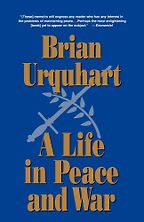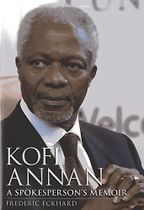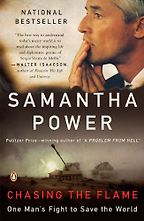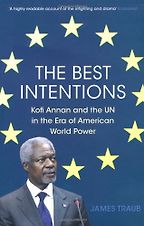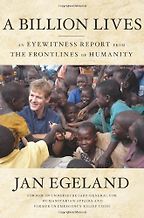Let’s start with A Life in Peace and War. Why is that first on your list of books about the United Nations?
I read this book long before I joined the UN. It came out in 1987 and it’s the autobiography of Brian Urquhart, whose life for the first 40 years of the United Nations was more or less synonymous with that of the organization.
He joined it before it really existed, in 1945, as a very young British soldier who had fought through the Second World War. And he was recruited to the team that was setting up the new international organization. So he was there right from the beginning, and he rose to the rank of Under-Secretary-General by the time he left in 1985. He was particularly involved in the creation and running of UN peacekeeping, which was a brilliant improvisation of the 1950s, because peacekeeping is not something that is prescribed in the United Nations Charter at all. He’s a delightful man, he’s now 90, and he’s still very much alive and writing brilliant articles in The New York Review of Books.
“The art of making the United Nations work is working out ways of getting governments to co-operate.”
But in this book, Brian describes first of all his early life: he was at Westminster School when Ribbentrop, who was then the German ambassador to London, tried to send his son to that school and Brian punched the boy, putting a fairly prompt end to that attempt at Nazi infiltration of a great British institution. He then spent six years in the army – he was a parachutist and was actually involved in the disastrous landing at Arnhem in 1944. Also, at the end of war, in April 1945, he was part of the group that arrived at Bergen-Belsen and saw the horrific sight of the inmates of that camp. So nobody could understand better what the cost of war was, and the importance of finding a different way of managing human affairs. So he had a very strong sense of the raison d’être of the United Nations.
But he was also an extremely practical man. He helped to come up with this idea of having lightly armed, neutral, United Nations forces between the combatants as a sort of confidence-building measure when there’s a ceasefire. It started at Sinai in 1956 – it was basically him, with Dag Hammarskjold and Lester Pearson, the then Canadian foreign minister, who invented this and it of course became perhaps the thing the UN is most famous for.
But the thing about Brian Urquhart is, he is a very important man, but he is also a delightful man, he has a wonderful sense of humour and the story is really worth reading; it’s extremely funny. There are wonderful episodes – of how he went as still quite a young junior official, with Trygve Lie, the first UN Secretary-General, to Geneva in the early 1950s and the Swiss police came to see him and said: “Do you know that your boss is visiting the cinema with a lady friend incognito?” And, apparently, Trygve Lie was using the pseudonym Rodney Witherspoon as a cover, and the police were worried that for the Secretary-General of the United Nations to be doing this might expose him to blackmail or be compromising in some way. And there’s another wonderful account, much, much later, in 1960, when Brian was in the Congo and he describes being in the office of Patrice Lumumba, the ill-fated Congolese prime minister, just after independence, and there was an office full of telephones, and when the telephone rang, Lumumba was never quite sure which of them it was that was ringing. And he’d rush around picking up one after the other, and saying “A qui ai-je l’honneur?” until his nine-year-old son, who was in the room, pointed to the phone that was actually ringing.
And then a bit later, he describes how he went to Katanga, which was a part of the Congo that had seceded under the leadership of a dreadful man called Moise Tshombe, and Brian actually got beaten up by this man’s thugs. But then he was sent for when Tshombe was having a meeting with an American senator, Dodd, (I think the father of the present Senator Dodd) and so he was brought from the police station or prison or wherever he was, and he writes something like: “I had the pleasure of bleeding profusely all over the white leather seats of Tshombe’s Mercedes.” And then he was brought in this bloody state into the presence of Senator Dodd, who was a great supporter of Tshombe, and believed he was a great force for civilization, for holding back communism in Africa – and here was this by then quite senior official of the United Nations, who’d been beaten to a pulp. It must have been a horrible experience at the time, but he makes it sound incredibly funny.
So I think almost anybody would enjoy reading this book, and certainly anybody who is starting work at the UN – it should probably be the first book they read, because it both gives you an extremely good idea of why we need the UN and how the UN came to be what it is, and also that it can be fun working for the UN, that it is something worth devoting your life to.
And does the book offer any insight into what has gone wrong at the UN, things that maybe should have been done differently at the beginning?
What you become aware of – and I think anybody who works for the UN or has anything much to do with it becomes aware of this – is how much it does depend on the member states. The United Nations is essentially an association of governments. And sometimes a brave and brilliant man like Hammarskjold can improvise to some extent, he can work out what governments might be able to live with or agree on, and propose that. But I think a lot of people tend to say: “Why doesn’t the UN do this?”, “Why doesn’t the UN do that?” And the reason is generally very simple: it’s because one of its most powerful members – sometimes it’s Russia, sometimes it’s the United States or China, wouldn’t let it do that. And the way it’s constructed, particularly the fact you have these five permanent members with veto, means that it can’t do it. So the art of making the United Nations work is working out ways of getting governments to co-operate. It’s not about ignoring them and thinking you can do something just on your own, just because it’s the right thing. However nice that might be in theory, it’s never going to work in practice.
Tell me about your next book, Kofi Annan, which is not yet available in English, only in French.
Yes, in contrast to my first choice, this is a book that is hot off the presses. Fred explains that the reason he came to write the book is that he was the spokesman for Kofi Annan dealing with all the attacks: the oil-for-food scandal and so on. And at the end, (and I also was working as part of Kofi Annan’s team at that time) we wanted to try and define Kofi’s legacy and his achievements. And Fred asked me: “Well, have we actually got a list of the most important things that Kofi Annan has done in ten years as Secretary-General?” And we realized that we didn’t. So we started compiling a list, and in a way that list has grown into this book. And Fred has set about writing it in a quite interesting way, which is he did drafts of the various chapters, and then he sent them around to all his friends and colleagues and people who knew Kofi well and had worked with him. And he asked for their comments, and that of course stimulated pretty much all of us to write back saying: “Well yes that’s right” or “No, that’s not quite right, but what you haven’t mentioned is this…”. So the account gradually got filled out.
Let’s go on to Samantha Power’s book on Sergio Vieira de Mello.
Now this is a very interesting book. Samantha Power is now working in quite a senior position in the Obama administration. She is in charge of multilateral affairs in the White House, the National Security Council. She became famous last year when she was on a tour selling this book. At the time she was advising Obama and the struggle between him and Hillary Clinton for the Democratic nomination was still going on. And she was interviewed by The Scotsman and said that “Hillary is a monster,” adding afterwards: “That’s off the record.” But the journalists at The Scotsman were a bit brutal and said that for it to be off the record she would have to have said it was off the record before she said it, not after. So it got published. And she had to resign, at least officially, from Obama’s campaign. But I think a number of people who knew her and knew him said: “Well that won’t last, and if he becomes president she’ll be back.” And sure enough she is back. And so that lends an extra interest to this book.
The other thing is that her previous book was about the United States and genocide, and particularly she wrote about Rwanda, and why everybody in Washington didn’t want to intervene in Rwanda, and why they allowed the genocide there to happen.
But in the course of her reporting and academic career, she had got to know this man, Sergio Vieira de Mello, who was a Brazilian, brilliant UN official. He worked initially mainly on the humanitarian side, for the UN High Commissioner for Refugees, and he was particularly in Bosnia. She was following the Bosnian war and she got to know him then. And eventually Kofi Annan sent him as the UN representative to Baghdad, after the American invasion in 2003. And he was blown up there, along with his staff, in an attack on UN headquarters in August of 2003. So it’s a tragic story. But the interesting thing about it is that Sergio was a philosopher by training – someone who cared passionately about issues – but he was also tremendously practical and very good at getting things done. And, according to the precise role he was playing, his attitude to some issues changed. In some cases, especially in the earlier part of his career, he was functioning as a humanitarian and would basically say “I will negotiate even with the devil, in order to get supplies through and to relieve suffering.” And he sometimes was prepared to go along with governments, or very unpleasant armed factions, in order to be able to help people who were in their power. Perhaps an extreme case was when he was repatriating refugees to Rwanda after the genocide, from Tanzania, and he pretty much violated what’s supposed to be a sacred principle of UNHCR, that people are only ever sent back of their own free will. And there was not much question that most of these people would rather have stayed in Tanzania. But the government of Tanzania didn’t want them. And Sergio basically came to the conclusion that the best (or least bad) thing in the circumstances was to organize this in a humane and civilized way – and a lot of people felt he was going too far in sacrificing principle to realpolitik. But then I think, partly as a result of the different jobs he was given, and partly of his observation of what was wrong and why these terrible humanitarian problems arise, he came around more to thinking that human rights and the basic principles of the UN are very important and sometimes they trump the immediate, short-term humanitarian considerations.
Get the weekly Five Books newsletter
So the book is very interesting because it’s about a very interesting man, who had a very interesting life, but also you feel that, in a way, it’s not only a book about Sergio Vieira de Mello, but also a book about Samantha Power; that she herself is wrestling with many of these dilemmas – about the relationship between power and idealism and how you get things right when you actually have responsibilities. I keep wondering what’s she thinking now about Sri Lanka, or other places in the world where terrible things are happening? And if she were writing the book about herself, now, what judgments would she make? And you can see that this is somebody who is quite honest and able to admit that problems are not simple and there often isn’t a straightforward black and white solution and you have to go for the lesser evil. And that’s pretty unpleasant when you’re dealing with a very unpleasant situation in which very large numbers of people are being killed or are in danger of being killed.
Your next book: The Best Intentions.
This is written by Jim Traub, who is a New York Times reporter and feature writer. And he had done a profile of Kofi Annan quite early in his term of office, and was obviously interested in him as a person. And then he thought, people will be interested when Kofi completes his term in some sort of insider’s account of what it was like. And so he essentially negotiated a deal with Kofi Annan, whereby he was kind of embedded in the Secretary-General’s office. Again, it’s quite a good read. Of course I was one of the people that he interviewed, although for some reason he describes me as having a stammer, which I don’t think anybody else ever has, maybe I was intimidated by him to the point of stammering…but otherwise he’s quite nice about me in the book, and generally he’s nice about quite a few people around Kofi Annan, and mostly about Kofi himself. Although there are places where he seems to be suggesting that Kofi Annan is a bit of a cold fish and not really deeply affected by some of the tragedies he was involved in, like Rwanda, which I think is probably unfair. I think he mistook the natural reserve and dignity of the man for a lack of feeling.
One of the reviews I read said Traub’s book proves that “UN page-turner is not an oxymoron”.
Well that’s very high praise. I’m not the best person to make the judgment, because obviously if you’re one of the characters in the story you’re going to be turning the pages quite eagerly. I would say that for me Brian Urquhart’s book is a page-turner, and Samantha Power’s book too. So perhaps it’s not quite as much of an oxymoron as people think. It is true that it is hard, and a lot of the things you have to explain about the UN are in the classic category of things that make people’s eyes glaze over.
So Traub’s topic is UN-US relations: it does strike me that the US attitude towards it is the biggest challenge facing the UN; there are so many people, especially on the right, who really hate it and want to marginalize it.
I think that’s one half of it. The other half is that the rest of the world or much of it, thinks that the UN doesn’t stand up to the US nearly enough, that it essentially serves more to ratify and legitimize the very unequal distribution of power in the world, than it does to correct it. And certainly that is the big challenge for every Secretary-General – he wants to be seen as a champion of the small, the oppressed, the weak, the poor, the great masses of the world. But he knows that in order to achieve anything he has to work with the very powerful and of course in these times, and throughout the history of the UN, that has always included whoever is in power in Washington. And you’re all the time having to explain to the one, why the other’s view matters. And you do indeed find a lot of Americans who basically can’t see the point of the UN if it’s not directly agreeing with or supporting whatever America thinks should be done at any given time. Then there are a very large number of people elsewhere in the world, who say: “Well what’s the point of having the UN if it doesn’t stand up to the US?” And in my job, as Director of Communications, I found I was endlessly having to try to explain to each of those parties why we couldn’t ignore the other.
But what about the UN bureaucracy?
By the standards of bureaucracies, if you compare it to the US federal government, it’s tiny, I think it’s tiny even compared to the New York Fire Department. Now whether all the people working there are doing a useful job is a perfectly fair question and should be asked. But it’s not actually an enormous bureaucracy.
Does it need reform?
I think it does, and I think it always will. I think one of the clichés that Kofi Annan used to use from time to time is that “reform is a process, not an event”. But I also think that a lot of people who go on about UN reform are not really interested in that. The real problems are much more political than they are administrative.
So, your last book, A Billion Lives.
This is written by Jan Egeland, a Norwegian who has done various jobs, mainly in the humanitarian field. For the last three-and-a-half years of Kofi Annan’s mandate he was the emergency relief co-ordinator and head of the Office for the Co-ordination of Humanitarian affairs. What’s interesting about Jan’s book is not so much the administration as the different conflicts that he was involved with. He’s obviously very idealistic, a classic Norwegian, Christian middle-class figure. There’s a lot about Darfur in the book. There’s a lot about the tsunami, which I think was on the whole a UN success, in that it did, by and large, pull together the relief effort after that major international catastrophe, in this case not a conflict, but a natural disaster.
Five Books interviews are expensive to produce. If you're enjoying this interview, please support us by donating a small amount.
And again, what comes out of this book, is the terrible dilemmas that often arise, the question of how far do you take account of political constraints? How far are you prepared to go along with people who are really very reprehensible, warlords and the like, in order to relieve people’s suffering? And also, when you take a stand on principle, how much you should publicize your views. For example, in the war in Lebanon in 2006, Jan Egeland was publicly and vocally critical of the Israeli bombing campaign in Lebanon and the amount of damage it did to civilians. He did also go to northern Israel and see the shelters where Israelis were hiding from Hezbollah rockets. But he got quite a lot of flak from Israel and its supporters for taking a public stand on that. And some people said: “Well, he should just get on with the job and not make public statements.” But I think by and large Kofi Annan felt that making these statements was part of the job. Where there were problems, where it was difficult for his staff to get through, or where they were threatened, it was his job to speak up for them, and he did.
Well it’s a reality of living in America that you can’t say anything about that conflict without being accused of being “anti-Israel”, and the UN is certainly perceived as being anti-Israel…
I think it’s one of the most difficult things that the UN has to deal with. The views about it are so polarized around the world; it’s perhaps of all the conflicts in the world, the one that has most repercussions beyond the geographical area where it’s happening. As you say, there are a lot of people in the United States, and to a lesser extent in Europe, who instinctively side with Israel and feel that it’s being unfairly criticized. Equally there are very large numbers of particularly Muslim people who feel the opposite. But it’s not only Muslims, because by and large the developing world tends to sympathize instinctively with the Palestinians, which it sees as the people that have suffered colonization, as most of the developing world has.
It was noticeable to me that the first years for Kofi Annan were on the whole the easiest, especially looking back on them afterwards. And I think one of the reasons for that was that that was the period of the Oslo peace process, when there was a temporary lowering of tension in the Middle East, and a relatively hopeful atmosphere. But when the second intifada started at the end of 2000 and the Camp David talks broke down, then the whole atmosphere in the organization became poison. Of course it wasn’t the only thing, there was also the Iraq war, but it was very noticeable. It made life difficult. The last couple of years I was there I was supposed to liaise with the American Jewish organizations. Kofi Annan certainly cared about Israel and he cares about Jews. His wife is the niece of Raoul Wallenberg, the man who saved large numbers of Hungarian Jews from the Holocaust before the Soviet army took him prisoner and he was never seen again.
So Kofi certainly has a strong sensitivity about the terrible things that have been done to the Jewish people, and feels that they have a right to a hearing and that Israel is also a member of the UN and is entitled to the same rights and treatment as other member states. Which it often doesn’t get. But, on the other hand, he to some extent had to try and stand up for the Palestinians, and had to stand up to his own staff, who were sometimes targeted by Israel. And he was also answerable to the membership as a whole, which includes a majority of states that are much more pro-Palestinian and very critical of Israel. While we were fighting a battle with American public opinion on the one hand, and as you say, one of the accusations against us was that we were anti-Israeli or anti-Semitic, through much of the Arab world we were seen as being much too soft on Israel, and much too willing to do what the US told us. So in a sense you can’t win with that kind of conflict. The only thing you can do is try to stick to your principles and try to make fair judgments about both sides. But that’s a lot easier said than done.
October 1, 2009. Updated: October 3, 2022
Five Books aims to keep its book recommendations and interviews up to date. If you are the interviewee and would like to update your choice of books (or even just what you say about them) please email us at [email protected]
